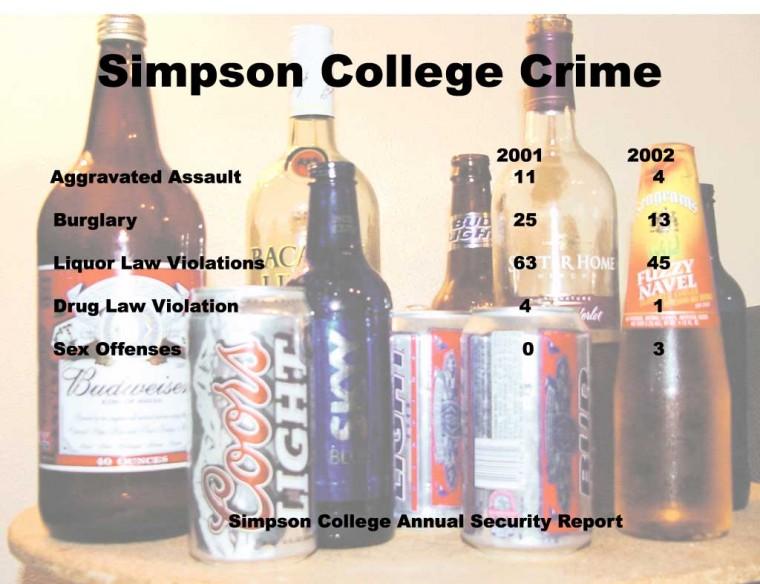Crime statistics up in 2001
October 10, 2002
The Simpson 2000-2001 annual security report shows increased amounts of crime on campus.
“Our larger numbers may be attributed to better enforcement and better recording of crime on campus,” said Chris Frerichs, director of campus security.
Simpson’s crime rates have increased in the categories of aggravated assault, burglary, liquor law violations and drug law violations. However, fewer cases of sexual assault were reported in 2001 than in 2000.
“I feel that single year variations in crime statistics don’t give an accurate overall picture of a campus. We need to look at crime over a longer time period, and if we do that we see that none of our changes this year are dangerously large,” said President Kevin LaGree.
“Our two main issues this year are underage drinking and sexual assaults. We are looking into classes dealing with those two,” Frerichs said.
Of Simpson’s five comparison schools, Central, Coe, Cornell, Luther and Wartburg, only Cornell had overall fewer reported cases of crime on their campus in 2001.
“We have taken control of our residence halls again, that’s why our crime is down,” said Bill Miler, director of campus security at Cornell College.
“Most schools nationwide have higher crime rates for the year 2001, but it varies by area of course,” said Howard Clery, executive director and treasurer of Security On Campus, Inc.
Aggravated Assault, Burglary, Sex Offenses
Simpson saw a large increase in aggravated assaults. Luther was the only other school to report an increase, the others remained the same or decreased.
“Our aggravated assault numbers can be largely attributed to a few individuals with an ongoing problem,” said Frerichs.
The number of burglaries on campus has increased by 92% in 2001 compared to 2000.
“We put a lot of emphasis on not propping doors on campus because if people can get in a building they have more chances to steal,” said Frerichs.
“I worry about burglary and robbery because those crimes often lead to more violent ones,” said Clery.
The only area that reported a decrease at Simpson for 2001 was sex offenses.
“Sex crimes happen, but due to the nature of the crime they aren’t always reported to campus security,” said Clery.
“Here at Simpson, we didn’t have any sex offenses reported in 2001, but that doesn’t mean they didn’t happen,” said Frerichs.
Liquor Law Violations, Drug Law Violations
The number of liquor law violations also increased from 2000 to 2001 in all schools, except Cornell.
“Liquor law violations are an especially big trend that colleges need to watch. They are dangerous because alcohol can and does lead to more violent crimes,” said Clery.
“The big issue that I worry about is alcohol abuse, because it is so rampant in our culture that students enter college trying to live up to myths about how much they can drink. Over consumption impairs judgment and may cause people to make decisions that harm themselves or others,” said LaGree.
Simpson had a 40 percent increase in liquor law violations from 2000 to 2001, but both Central and Coe had over 50 percent increases.
“The increase in liquor law violations is within a trend and can be explained by our continually increasing enforcement of the college’s policies,” said Frerichs. “This year we implemented a four-hour online alcohol education course that first-time violators are required to take.”
Drug law violations are another statistic that went up in 2001 at Simpson.
“Drug use on campus is a concern and we’re looking into some programs that will deal with it,” said Frerichs.
“[We] have a huge awareness program and younger people have to take responsibility and realize that their actions have results,” said Miler.
Preventing Crime
Although crime rates continued to climb, there are a number of things that can be done to prevent crime on campus.
“Many schools are taking action to halt crime on campus,” said Clery. “The schools work with the communities to make underage drinking more difficult, to keep students from propping doors, to install camera systems and use key cards, and do many things to make campuses more secure..”
“This month is Crime Prevention Month and Simpson is going to have the Iowa State Patrol set up a booth on campus that deals with safety issues for college students,” said Frerichs. “We also try to get information out to students year-round through the RA’s.”
“A lot of safety issues depend on our students,” said Frerichs. “They know that they need to take care of themselves and their choices are a major factor in those numbers. If they choose to lock their doors and look out for each other, the numbers are going to reflect that.”
“What makes a campus, or any community, safe is looking out for each other and working with security officials,” said LaGree. “I think Simpson does a good job of that.”





